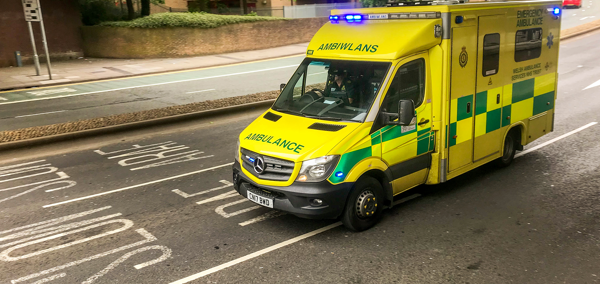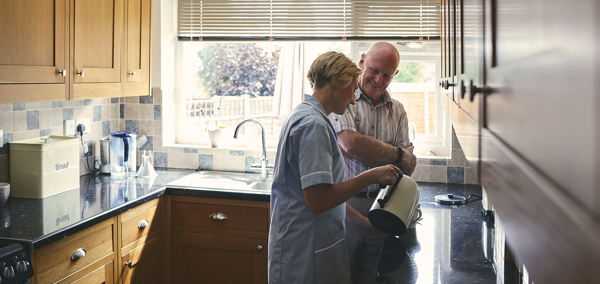A Senedd Committee is calling for immediate action to address the amount of time patients are stuck in hospital after recovering from illness.
The Health and Social Care Committee’s report found that a workforce crisis in the social care sector is resulting in patients staying in hospital for days, or even weeks, longer than necessary.
This creates a backlog within the healthcare system leading to ambulances queuing up outside A&E for hours, unable to admit seriously ill patients and unavailable to help other members of the public.
Stuck in hospital
The report acknowledges that it is currently difficult to gauge the full extent of the problem as the Welsh Government suspended reporting requirements on ‘delayed transfers of care’ at the start of the pandemic and introduced new discharge guidance.
The Committee’s report outlines how family members and unpaid carers are being put in the impossible position of either leaving their loved ones in hospital longer than necessary or taking on further caring responsibilities they are not necessarily equipped to cope with.
For patients stuck in hospital beds - who are disproportionately older people - the wait to be discharged can create more medical issues such as a heightened risk of infection and of mental dependency.
The patient’s general physical abilities may also decline rapidly which can result in an increased likelihood of falls and further injury in the future.

Ambulance delays
The inability to safely discharge patients has a knock-on effect within the healthcare system, with ambulances having to wait outside A&E for beds to become available.
This leads to lengthy waits for ambulances to treat people who are injured and in pain - in some cases with life-threatening consequences.
Evidence given to the Committee from the Morgannwg Local Medical Committee warned that the shortage of ambulances meant that GPs were even sending patients to hospital in cars when they should be going in ambulances.
Jason Killens, Chief Executive of the Welsh Ambulance Services NHS Trust told the Committee that “considerable amounts of our capacity are unavailable to us” which has led to patients waiting unassisted for “very long periods of time”.
He acknowledged that “the level of service that we're offering to those patients is unacceptable” and said that the Welsh Ambulance Services NHS Trust was “doing everything we can to improve that.”
‘System reset’
The Welsh Government and NHS Delivery Unit led a ‘system reset’ across health and social care services in March 2022 to support flow throughout the system and reduce the number of patients experiencing delayed transfers of care.
The report welcomes this but calls for the Welsh Government to provide an update before the end of the year on how effective the reset has been and what impact it has had on reducing the number of people stuck in hospital for longer than is needed.

Russell George MS
Chair of the Health and Social Care Committee
“Behind every delay is a person who has not received the care and support they need to enable them to return home, or to move into appropriate accommodation.
“This leaves thousands of family members and unpaid carers having to choose between leaving someone in hospital or deciding to take on even more caring responsibilities.
“Hearing about ambulances queuing outside A&E while people suffering severe injury are left to wait for hours – sometimes with life-threatening consequences - is deeply worrying.
“But unless radical steps are taken to reform the way in which social care is provided, rewarded and paid for, we are unlikely to see the changes necessary to stop patients being stranded in hospitals.
“For there to be more than 1,000 people in hospital beds when they could have been discharged is totally unacceptable. The Welsh Government needs to take urgent action to resolve this situation.”

Social care recruitment
The report said that attracting people to work in social care is becoming increasingly difficult and until parity with the healthcare workforce is achieved, the sector will continue to struggle.
The Committee acknowledges that the Welsh Government has already taken action to address social care workforce issues, including a recruitment campaign and the introduction of Real Living Wage for social care workers.
However, the Committee is calling on the Welsh Government to deliver further reforms to the pay and working conditions for social care workers as soon as possible.
This includes providing an update on the introduction of a national pay structure for care and addressing the fact that some social care workers only receive Statutory Sick Pay (currently £99.35 per week) if they are unable to work due to ill health.
The report also calls on the Welsh Government to explain how it will increase recruitment to this sector.
Dementia
The Committee was told there was a need for greater understanding of the needs of people with dementia in hospitals and how best to support them to make their situation less frightening.
The Committee also heard of several instances where people were discharged from hospital late at night, in areas with little or no public transport, and told to make their own way home.
The report urges the Welsh Government to trial set discharge times for people with dementia to help care homes, carers and families better plan for their discharge.
Angela Davies, an unpaid carer whose father has dementia, told the Committee about her experience of the discharge process:
“We had a phone call at 4 o'clock in the afternoon to say that my father was ready to be picked up and he was fine. 'Nothing wrong with him. Great. Can go upstairs'.
"I was working, we scrambled together, we went to pick him up at 6 o'clock, he was struggling to walk. I was told he was dry. He wasn't, he was incontinent."
"He was soaking by the time we got him home. He couldn't go upstairs, he had to sleep on the sofa that night. At no point did anybody from the hospital check the home. They said he didn't need a care package. We had nothing.”
More on this story
Discover the recommendations of the Health and Social Care Committee for addressing the amount of time patients are waiting in hospital after recovering from illness.
Inquiry: Hospital discharge and its impact on patient flow through hospitals




